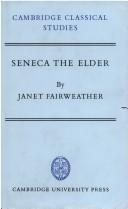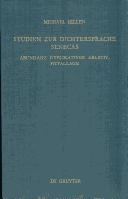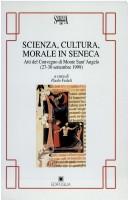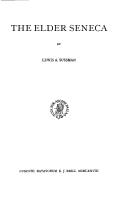| Listing 1 - 10 of 10 |
Sort by
|
Book
Year: 1864 Publisher: Marburg,
Abstract | Keywords | Export | Availability | Bookmark
 Loading...
Loading...Choose an application
- Reference Manager
- EndNote
- RefWorks (Direct export to RefWorks)
Book
Year: 1649 Publisher: Lvgd Batav. : ex Officina Elseviriana,
Abstract | Keywords | Export | Availability | Bookmark
 Loading...
Loading...Choose an application
- Reference Manager
- EndNote
- RefWorks (Direct export to RefWorks)
Book
Year: 1649 Publisher: Lugduni Batavorum : Off. Elseviriana,
Abstract | Keywords | Export | Availability | Bookmark
 Loading...
Loading...Choose an application
- Reference Manager
- EndNote
- RefWorks (Direct export to RefWorks)

ISBN: 0521231019 0521044359 0511659164 9780521231015 9780511659164 9780521044356 Year: 1981 Publisher: Cambridge Cambridge University Press
Abstract | Keywords | Export | Availability | Bookmark
 Loading...
Loading...Choose an application
- Reference Manager
- EndNote
- RefWorks (Direct export to RefWorks)
A feature of Roman rhetorical education under the early empire was the dominance of the declamatio - the declamation on a mythological, historical or quasi-legal theme designed in the first place to train students for the law courts and political debating but indulged in for its own sake by amateurs as well as students and teachers of rhetoric. The elder Seneca, father of the philosopher and dramatist, compiled an anthology of the often bizarre utterances of the declaimers. Janet Fairweather's 1981 book is a detailed study of the anthologist's literary criticism. From Seneca's prefactory descriptions of declaimers and passing remarks on their work, she derives evidence for all the stages in the preparation and delivery of declamations; and from the same source, in conjunction with select declamatory extracts, she shows that rhetorical taste in Seneca's time was not so uniform as is commonly supposed.
Seneca [Younger] --- Seneca, Lucius Annaeus, --- Seneca, Lucius Annaeus --- Sénèque --- Seneca, Annaeus, --- Seneca, --- Séneca, --- Seneca, M. Annaeus --- Seneca, Marcus Annaeus, --- Sénèque, --- Arts and Humanities --- History

ISBN: 3110117983 3110846799 9783110117981 Year: 1989 Volume: 32 Publisher: Berlin: de Gruyter,
Abstract | Keywords | Export | Availability | Bookmark
 Loading...
Loading...Choose an application
- Reference Manager
- EndNote
- RefWorks (Direct export to RefWorks)
Seneca [Younger] --- Seneca, Lucius Annaeus --- Style [Literary ] --- Tragedies --- Seneca, Lucius Annaeus, --- Language. --- Dichtersprache. --- Geschichte 30-70. --- Latein. --- Seneca, Lucius Annaeus ‹Philosophus›. --- Tragödie. --- HISTORY / Ancient / General. --- Seneca, Annaeus, --- Seneca, --- Séneca, --- Seneca, M. Annaeus --- Seneca, Marcus Annaeus, --- Sénèque,

ISBN: 8872283035 Year: 2001 Volume: 18 Publisher: Bari Edipuglia
Abstract | Keywords | Export | Availability | Bookmark
 Loading...
Loading...Choose an application
- Reference Manager
- EndNote
- RefWorks (Direct export to RefWorks)
Ethics in literature --- Morale dans la littérature --- Seneca, Lucius Annaeus, --- Morale dans la littérature --- Seneca, Annaeus, --- Seneca, --- Séneca, --- Seneca, M. Annaeus --- Seneca, Marcus Annaeus, --- Sénèque,
Book
ISBN: 9780198746010 9780192506511 0191808725 019106310X 019250651X 0198746016 Year: 2020 Publisher: Oxford: Oxford University Press,
Abstract | Keywords | Export | Availability | Bookmark
 Loading...
Loading...Choose an application
- Reference Manager
- EndNote
- RefWorks (Direct export to RefWorks)
Situated at the crossroads of rhetoric and fiction, the genre of declamatio offers its practitioners the freedom to experiment with new forms of discourse. This volume places the literariness of Roman declamation into the spotlight by showcasing its theoretical influences, stylistic devices, and generic conventions as related by Seneca the Elder, the author of the Controversiae and Suasoriae, which jointly make up the largest surviving collection of declamatory speeches from antiquity. 0Authored by an international group of leading scholars of Latin literature and rhetoric, the chapters explore not only the historical roles of individual declaimers, but also the physical and linguistic techniques upon which they collectively drew. In addition, the 'dark side of declamation' is illuminated by contributions on the competitiveness of the arena and the manipulative potential of declamatory skill and, in keeping with the overall treatment of declamation as a literary phenomenon, a section has also been dedicated to intertextuality. Drawing on thought-provoking analyses of Seneca the Elder's works, the volume highlights the complexity of these texts and maps out, for the first time, the socio-cultural context for their composition, delivery, and reception, as well as providing a comprehensive, innovative, and up-to-date treatment of Roman declamation that will be essential for both students and scholars in the fields of Latin literature, Republican Roman history, and rhetoric
Seneca, Lucius Annaeus, --- Seneca, Annaeus, --- Seneca, --- Séneca, --- Seneca, M. Annaeus --- Seneca, Marcus Annaeus, --- Sénèque, --- E-books --- Seneca, Lucius Annaeus, - approximately 55 B.C.-approximately 39 A.D

ISBN: 9004057595 9004327681 9789004057593 9789004327689 Year: 1978 Volume: 51 Publisher: Leiden: Brill,
Abstract | Keywords | Export | Availability | Bookmark
 Loading...
Loading...Choose an application
- Reference Manager
- EndNote
- RefWorks (Direct export to RefWorks)
Seneca [Younger] --- Authors, Latin --- Ecrivains latins --- Biography. --- Biographies --- Seneca, Lucius Annaeus, --- Rome --- Intellectual life. --- Vie intellectuelle --- Sénèque l’Ancien, --- Biography --- Intellectual life --- -Authors, Roman --- Latin authors --- Roman authors --- Seneca, Lucius Annaeus --- -Biography --- Sénèque --- Seneca, Annaeus, --- Seneca, --- Séneca, --- Seneca, M. Annaeus --- Seneca, Marcus Annaeus, --- Sénèque, --- Rim --- Roman Empire --- Roman Republic (510-30 B.C.) --- Romi (Empire) --- Byzantine Empire --- Rome (Italy) --- Authors, Latin. --- Cultural life --- Culture --- Authors, Roman --- Rome (Empire) --- Roman Republic --- Italy --- Authors, Latin - Biography --- Seneca, Lucius Annaeus, - approximately 55 BC-approximately 39 AD --- Sénèque l’Ancien, 54 av JC-39 --- Rome - Intellectual life
Book
ISBN: 3110388154 3110306344 9783110306347 3110306182 9783110388152 9783110306187 Year: 2018 Publisher: Berlin Boston
Abstract | Keywords | Export | Availability | Bookmark
 Loading...
Loading...Choose an application
- Reference Manager
- EndNote
- RefWorks (Direct export to RefWorks)
The collection of the elder Seneca assembles "ations from scores of declaimers over a period spanning sixty years, from the Augustan Age through the early decades of the empire. A view is offered onto a literary scene, for this critical period of Roman letters, that is numerously populated, highly interactive, and less dominated by just a few canonical authors. Despite this potential, modern readings have often lumped declaimers together en masse and organizational principles basic to Seneca's collection remain overlooked. This volume attempts to 'hear' the individual speech of declaimers by focusing on two speakers-Arellius Fuscus, rhetor to Ovid, and Papirius Fabianus, teacher of the younger Seneca. A key organizing principle, informing both the collection and the practice of declamation, was the 'shared locus'-a short passage, defined by verbal and argumentative ingredients, that gained currency among declaimers. Study of the operation of the shared locus carries several advantages: (1) we appreciate distinctions between declaimers; (2) we recognize shared passages as a medium of communication; and (3) the shared locus emerges as a community resource, explaining deep-seated connections between declamation and literary works.
E-books --- Rhetoric, Ancient. --- Ancient rhetoric --- Classical languages --- Greek language --- Greek rhetoric --- Latin language --- Latin rhetoric --- Rhetoric --- Fabianus, Papirius, --- Seneca, Lucius Annaeus, --- Fuscus, Arellius, --- Fuscus, Aurelius, --- Seneca, Lucius Annaeus --- Sénèque --- Seneca --- Papirius Fabianus, --- Criticism and interpretation --- Annaeus Seneca, Lucius, --- Seneca, Annaeus, --- Seneca, --- Seneca, L. A. --- Seneca, Lucio Anneo, --- Seneka, --- Seneka, L. Annėĭ, --- Sénèque, --- סנקא, לוציוס אנאוס --- Pseudo-Seneca --- Séneca, --- Seneca, M. Annaeus --- Seneca, Marcus Annaeus, --- Prose literature. --- Recitations. --- Rhetoric. --- LITERARY CRITICISM / Ancient & Classical. --- Seneca the Elder. --- declamation. --- rhetoric. --- Language and languages --- Speaking --- Authorship --- Expression --- Literary style --- Declamation --- Speakers (Recitation books) --- Speeches, addresses, etc. --- Literature
Book
ISBN: 1785273825 1785273817 1785273833 9781785273834 9781785273827 Year: 2020 Publisher: London : Anthem Press,
Abstract | Keywords | Export | Availability | Bookmark
 Loading...
Loading...Choose an application
- Reference Manager
- EndNote
- RefWorks (Direct export to RefWorks)
'Rethinking Therapeutic Reading' uses a combination of literary criticism and experimental psychology to examine the ways in which literature can create therapeutic spaces for personal thinking. It reconsiders the role that serious literary reading might play in the real world, reclaiming literature as a vital tool for dealing with human troubles.Part one of the book analyses the work of four representative authors: Seneca, Montaigne, Wordsworth and George Eliot. Part two sets out the results of a series of three practical reading experiments, particularly concerned with reading Wordsworth and George Eliot. Designed to examine what it is that literature can do to and for modern readers, the experiments provide primary evidence to support the argument that serious literary reading has an important and potentially therapeutic function in modern society.
Bibliotherapy. --- Books and reading --- Criticism. --- Psychology, Experimental. --- Literature --- Reading, Psychology of. --- Belles-lettres --- Western literature (Western countries) --- World literature --- Philology --- Authors --- Authorship --- Experimental psychology --- Psychology --- Experimental psychologists --- Criticism --- Evaluation of literature --- Literary criticism --- Rhetoric --- Aesthetics --- Books --- Reading --- Reading therapy --- Psychotherapy --- Reading, Psychology of --- Psychological aspects. --- Research --- Experiments --- Technique --- Evaluation --- Therapeutic use --- Seneca, Lucius Annaeus, --- Montaigne, Michel de, --- Wordsworth, William, --- Eliot, George, --- Wœ̄tsawœ̄t, Winlīam, --- Wurdzwurth, Wilyam, --- Varḍsavartha Viliyama, --- Axiologus, --- Montagne, Michel de, --- Montenʹ, Mishelʹ, --- Montanʹe, Mikhaĭlo, --- Montaigne, Michel Eyquem de, --- Montaigne, --- Montēnyu, --- Montaini, Misel d̲e, --- דה־מונטן, מישל, --- די־מונטין, מיכאל, --- מונטין, מישל דה, --- Montenj, Mišel de, --- Seneca, Annaeus, --- Seneca, --- Séneca, --- Seneca, M. Annaeus --- Seneca, Marcus Annaeus, --- Sénèque, --- de Montaigne, Michel Eyquem --- Eyquem, Michel --- Monten', Mišel' --- Cross, Marian Evans, --- Evans, Marian, --- Eliot, Džordž, --- Ėliot, Dzhordzh, --- Cross, Mary Ann, --- Lewes, M. E. --- Lewes, Marian Evans, --- Elliŏtʻū, Choji, --- Eliyaṭ, Jārj, --- Evans, Mary Anne, --- אליוט, ג׳ַַורג׳ --- אליוט, ג׳ורג׳, --- עליאט, דזשארדזש --- עליאט, דזשארדזש, --- עליוט ג׳יארג׳, --- עליוט, גי׳ארג׳, --- עליוט, ג׳רארג׳, --- Bibliotherapy --- Psychology, Experimental --- Experimental Psychology --- Experimental Psychologies --- Psychologies, Experimental --- Bibliotherapies
| Listing 1 - 10 of 10 |
Sort by
|

 Search
Search Feedback
Feedback About UniCat
About UniCat  Help
Help News
News